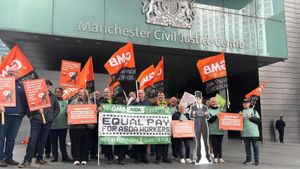Political instability continues to grip France as Prime Minister François Bayrou prepares to advance the government's 2025 budget with the controversial invocation of Article 49.3 of the French constitution. This constitutional measure enables the government to pass laws without parliamentary approval, potentially triggering significant political fallout.
On Monday, Bayrou, who was appointed by President Emmanuel Macron on December 13, will attempt to push through this key piece of legislation amid concerns over the lack of governmental stability. The absence of clear majority support following the uncertain outcome of last summer's legislative elections prompts Bayrou's drastic move. "Now we must move toward adoption without delay. A country like ours cannot remain without a budget," stated Bayrou, emphasizing the urgency of the situation during his interview with La Tribune Dimanche.
This decision to rely on Article 49.3, which opens the floodgates for opposition parties to propose no-confidence motions, has already led the hard-left France Unbowed (La France Insoumise or LFI) to announce its intent to lodge such a motion. Support from the Communist Party and the Ecology party (EELV) is expected for this initiative, though the far-right National Rally (RN) has yet to clarify its stance. With the Senate session looming, this high-stakes political maneuver could spell the end for Bayrou's short-lived government.
This volatile scenario mirrors events from December, when former Prime Minister Michel Barnier utilized the same constitutional provision to force through budget legislation, culminating in his resignation shortly after. With little more than two weeks in office, Bayrou now faces steep challenges. His government lacks the necessary parliamentary majority to pass budget legislation through conventional means.
Bayrou has indicated he may invoke Article 49.3 twice on Monday, targeting both the national budget and the social security budget. The temporary nature of the budget's approval might placate immediate concerns but raises questions about the long-term viability of his administration. His pledge to engage governmental responsibility demonstrates his awareness of the high stakes involved.
The legislative debates on the budget are set against the backdrop of continuous political fragmentation within the National Assembly. This division has left parliamentary factions loosely aligned, lacking any entity with absolute majority influence. Bayrou's administration has proposed revised budget plans to curtail France's deficit to 5.4% of GDP, offering reassurances to opposition figures who remain wary of the financial imbalances. Notably, maintaining functions like the education sector’s employment levels affirms Bayrou’s commitment to mitigating large-scale cuts.
Miscalculations could prove costly for Bayrou, and the current political climate indicates the Socialists could play pivotal roles during the upcoming no-confidence vote. While they have expressed skepticism toward the government, they have also sought constructive negotiations on budgetary matters. Boris Vallaud, the head of the Socialist parliamentary group, articulated the party’s intent: "We hear the concerns, the fears of businesses, communities, or associations. They are real. And we will fight for those interests."
The stakes are particularly high this time around, as failure to navigate these presenting issues could resurrect the chaos experienced through the previous government's collapse, plunging France back toward political paralysis. The looming no-confidence motion, scheduled for Wednesday, plays out as tension heightens across the political spectrum.
François Villeroy de Galhau, the governor of the Bank of France, emphasized the country's need for fiscal resolution, stating, "To begin to reduce uncertainty, France needs a budget… one reducing the deficit." The urgency of adopting the budget, which is anticipated to come to fruition later this month, weighs heavily on Bayrou’s shoulders.
For the time being, the clock is ticking, and the upcoming legislative debates are fraught with tension as political factions determine their next moves. Bayrou’s precarious alignment with the Socialists and the divisive rhetoric surrounding issues like immigration could sway the votes needed to secure his tenure as Prime Minister. This dynamic only serves to highlight the intensifying political climate and the hurdles Bayrou must clear to advocate for lasting legislative reform.
Political analysts will undoubtedly watch closely as France approaches another pivotal moment, questioning whether Bayrou can sustain his government against two powerful adversaries: rapidly diminishing public confidence and the entrenched opposition vying to overturn his administration.



